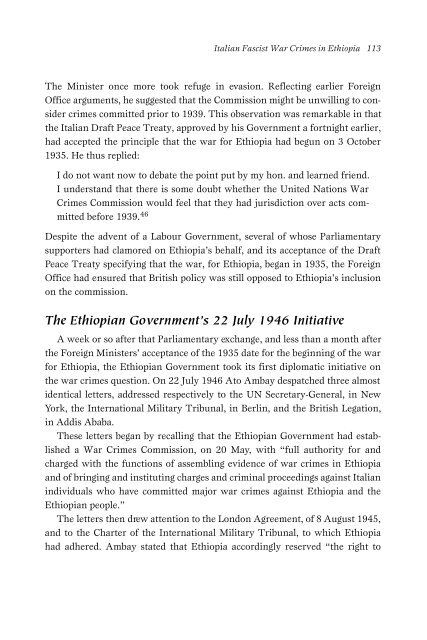Italian Fascist War Crimes in Ethiopia - Societa italiana di storia ...
Italian Fascist War Crimes in Ethiopia - Societa italiana di storia ...
Italian Fascist War Crimes in Ethiopia - Societa italiana di storia ...
Create successful ePaper yourself
Turn your PDF publications into a flip-book with our unique Google optimized e-Paper software.
<strong>Italian</strong> <strong>Fascist</strong> <strong>War</strong> <strong>Crimes</strong> <strong>in</strong> <strong>Ethiopia</strong> 113<br />
The M<strong>in</strong>ister once more took refuge <strong>in</strong> evasion. Reflect<strong>in</strong>g earlier Foreign<br />
Office arguments, he suggested that the Commission might be unwill<strong>in</strong>g to consider<br />
crimes committed prior to 1939. This observation was remarkable <strong>in</strong> that<br />
the <strong>Italian</strong> Draft Peace Treaty, approved by his Government a fortnight earlier,<br />
had accepted the pr<strong>in</strong>ciple that the war for <strong>Ethiopia</strong> had begun on 3 October<br />
1935. He thus replied:<br />
I do not want now to debate the po<strong>in</strong>t put by my hon. and learned friend.<br />
I understand that there is some doubt whether the United Nations <strong>War</strong><br />
<strong>Crimes</strong> Commission would feel that they had juris<strong>di</strong>ction over acts committed<br />
before 1939. 46<br />
Despite the advent of a Labour Government, several of whose Parliamentary<br />
supporters had clamored on <strong>Ethiopia</strong>’s behalf, and its acceptance of the Draft<br />
Peace Treaty specify<strong>in</strong>g that the war, for <strong>Ethiopia</strong>, began <strong>in</strong> 1935, the Foreign<br />
Office had ensured that British policy was still opposed to <strong>Ethiopia</strong>’s <strong>in</strong>clusion<br />
on the commission.<br />
The <strong>Ethiopia</strong>n Government’s 22 July 1946 Initiative<br />
A week or so after that Parliamentary exchange, and less than a month after<br />
the Foreign M<strong>in</strong>isters’ acceptance of the 1935 date for the beg<strong>in</strong>n<strong>in</strong>g of the war<br />
for <strong>Ethiopia</strong>, the <strong>Ethiopia</strong>n Government took its first <strong>di</strong>plomatic <strong>in</strong>itiative on<br />
the war crimes question. On 22 July 1946 Ato Ambay despatched three almost<br />
identical letters, addressed respectively to the UN Secretary-General, <strong>in</strong> New<br />
York, the International Military Tribunal, <strong>in</strong> Berl<strong>in</strong>, and the British Legation,<br />
<strong>in</strong> Ad<strong>di</strong>s Ababa.<br />
These letters began by recall<strong>in</strong>g that the <strong>Ethiopia</strong>n Government had established<br />
a <strong>War</strong> <strong>Crimes</strong> Commission, on 20 May, with “full authority for and<br />
charged with the functions of assembl<strong>in</strong>g evidence of war crimes <strong>in</strong> <strong>Ethiopia</strong><br />
and of br<strong>in</strong>g<strong>in</strong>g and <strong>in</strong>stitut<strong>in</strong>g charges and crim<strong>in</strong>al proceed<strong>in</strong>gs aga<strong>in</strong>st <strong>Italian</strong><br />
<strong>in</strong><strong>di</strong>viduals who have committed major war crimes aga<strong>in</strong>st <strong>Ethiopia</strong> and the<br />
<strong>Ethiopia</strong>n people.”<br />
The letters then drew attention to the London Agreement, of 8 August 1945,<br />
and to the Charter of the International Military Tribunal, to which <strong>Ethiopia</strong><br />
had adhered. Ambay stated that <strong>Ethiopia</strong> accord<strong>in</strong>gly reserved “the right to

















